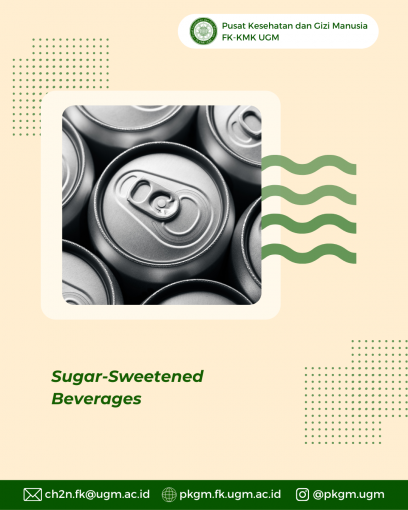
Sugar-sweetened beverages (SSB) are any type of drinks that are sweetened with added sugars, such as brown sugar, corn sweetener, corn syrup, dextrose, fructose, glucose, high-fructose corn syrup, honey, lactose, malt syrup, maltose, raw sugar, and sucrose (1,6). This includes, but are not limited to, regular soda, fruit drinks, sports drinks, energy drinks, sweetened waters, also coffee and tea beverages with added sugars (1). SSB usually contains high calories but it will not make you feel as full as if you had eaten the same calories from solid food. There is a research (2) that explained about sugar content of SSB per serving of product in Indonesia by sampling 91 SSB products from a popular convenience store. On an average, the amount of sugar per serving was 22.8 g or 86.3 g/1000 ml. Sugar in sports drinks had the highest contribution to energy of products (93.33%).
Many researches have explained consuming SSB frequently is associated with weight gain or obesity, type 2 diabetes, heart disease, kidney diseases, non-alcoholic liver disease, tooth decay, cavities, and gout (3,4,5,7). People who consume sugary drinks regularly—1 to 2 cans a day or more—have a 26% greater risk of developing type 2 diabetes than people who rarely have such drinks (3). A study that tracked the health of nearly 90,000 women over two decades, found that women who drank more than two servings of sugary beverage each day had 40% higher risk of heart attacks or death from heart disease than women who rarely drank sugary beverages (5). A study of 33,097 individuals showed that among people with a genetic predisposition for obesity, those who drank sugary drinks were more likely to be obese than those who did not (4). This study is important because it suggests genetic risk for obesity does not need to become a reality if healthy habits, like avoiding sugary drinks, are followed.
Indonesian Health Ministry recommends that daily sugar intake does not exceed 50 grams or 4 tablespoons. In fact, based on previous research mentioned (2), the content of sugar alone in carbonated beverages per serving has reached 33.6 grams or 67.2% of the daily intake. It means that only 32.8% of sugar could be obtained from other foods. Another example is that ice cream contains 22 g sugar per serving or 44% of daily intake. Therefore, it is necessary for consumer to read nutrition label before purchasing the product.
Knowing the bad effects of consuming SSB, plain water is always the best option to choose or beverages with few or no calories. If you are willing to contribute to society, asking schools or workplaces to provide filtered water or water fountain is a good move. You can also help yourself by not stocking soda, fruit punch, or other sugary drinks in the house and making them an occasional treat rather than a daily beverage.
- CDC (2021). Get the Facts: Sugar-Sweetened Beverages and Consumption. [online] Centers for Disease Control and Prevention. Available at: https://www.cdc.gov/nutrition/data-statistics/sugar-sweetened-beverages-intake.html [Accessed 26 Feb. 2022].
- Haning, Mohamad Thahir & Arundhana, Andi Imam & Muqni, Asry. (2016). The government policy related to sugar-sweetened beverages in Indonesia. Indian Journal of Community Health. 28. 222-227.
- Malik VS, Hu FB. Sugar-sweetened beverages and cardiometabolic health: An update of the evidence. Nutrients. 2019;11(8):1840.
- Qi Q, Chu AY, Kang JH, Jensen MK, Curhan GC, Pasquale LR, Ridker PM, Hunter DJ, Willett WC, Rimm EB, Chasman DI. Sugar-sweetened beverages and genetic risk of obesity. New England Journal of Medicine. 2012 Oct 11;367(15):1387-96.
- Schulze MB, Manson JE, Ludwig DS, Colditz GA, Stampfer MJ, Willett WC, Hu FB. Sugar-sweetened beverages, weight gain, and incidence of type 2 diabetes in young and middle-aged women. JAMA. 2004 Aug 25;292(8):927-34.
- The Nutrition Source. (2013). Sugary Drinks. [online] Available at: https://www.hsph.harvard.edu/nutritionsource/healthy-drinks/sugary-drinks/ [Accessed 26 Feb. 2022].
- Valenzuela MJ, Waterhouse B, Aggarwal VR, Bloor K, Doran T. Effect of sugar-sweetened beverages on oral health: a systematic review and meta-analysis. Eur J Public Health. 2020.
